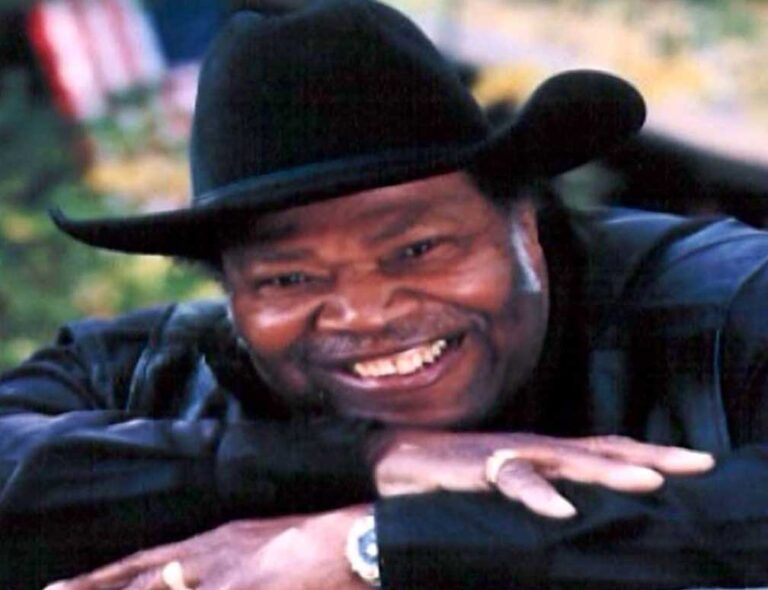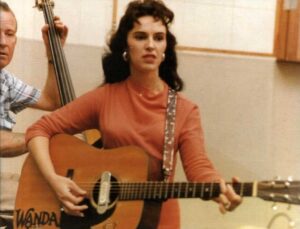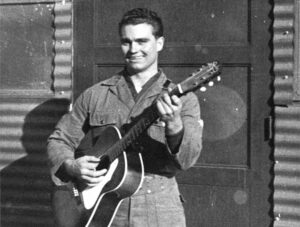Only one performing artist can lay claim to having the No. 1 disco single in the U.S. and Europe one year and following it up with a Top 20 country single just two years later. And the fact that artist was a Black man only makes the feat more impressive.
Considering his background, it’s only natural that “Big” Al Downing would be the man to achieve this feat.
Alexander “Al” Downing was born in 1940, one of 12 children in a sharecropping family in Centralia, Oklahoma. Young Al had no musical training, but he grew up singing gospel songs with his family. It wasn’t long until he and his brothers dragged home a broken-down piano. At age 12, Downing was introduced to his first musical instrument. By banging the keys of the piano — only 40 of which worked — he learned to imitate the likes of Fats Domino, Jerry Lee Lewis, Elvis and Little Richard. He did it all by ear.
When Downing’s parents saved enough money to pay for piano lessons for their boy, the instructor told his parents, after just one lesson, to leave him alone. “He has a gift from God,” the instructor said. Downing never did learn to read music, and he played by ear throughout his career.
By the time Downing was 17, he faced a decision. Would he go for a career in. music, or would he accept the offer of a basketball scholarship to Kansas State University?
While trying to decide, he entered a talent show in Coffeyville, Kansas … and took home first prize for his rendition of “Blueberry Hill.” As fate would have it, Bobby Poe, an area band leader who just happened to be in the audience for that performance, tracked Downing down and asked him to join his band.
The decision was made on the spot: Basketball’s loss would be music’s gain.
The Poe Band played rockabilly music across Kansas and Oklahoma at beer joints and other small venues. A year later, country star Wanda Jackson heard the band and hired them on for her upcoming tour. Downing, who had now earned the nickname “Big” Al because of his 6-foot, 3-inch, 275- pound frame, was the only Black member of the entourage.
Downing claimed that he never experienced much in the way of racism as a child — but that changed once he joined Jackson’s band. He couldn’t stay in the same hotels as the band, and he couldn’t eat in the same restaurants. On occasion, a promoter would tell Jackson her big piano player wasn’t welcome on stage. To that she would answer, “Let’s pack it up,” and the performance would be canceled.
When the gig with Jackson ended, the Poe Band moved east, where, the group had heard, a band could make a hundred dollars a week around Boston. That was big money in those days, but the band wound up playing seven days a week, 13 hours a day — and all for the sum of $90. Still, Downing believed it was good money.
Over the course of his first decade in the music business, Big Al Downing played it all, from gospel to rockabilly, rhythm and blues to country. But he never made a big splash for himself. And Downing didn’t want to play in a backup band all his life; he wanted to play front and center.
In the early 1970s, he cut a couple of solo songs, but they received no exposure. But when fame struck, it struck hard.
Disco music was all the rage in the mid-1970s. In 1975, Big Al Dowing cut a record that would set his career in motion. The self-written, “I’ll Be Holding On” tracked up the disco charts in both the U.S. and Europe, eventually spending three weeks at No. 1.
Although Downing said he hated the genre, he went looking for more disco material to cut an album. That’s when a producer asked Downing to play some of his country tunes. “He brought out the country in me,” Downing said.
Downing’s next charting song came two years later when Warner Records released “Mr. Jones,” a song that climbed into Country Music’s Top 20. It was a risqué move for a singer who was looking to break into commercial country music, as the song told the story of a Black sharecropper who was raising a white son.
While critics couldn’t handle the nature of the lyrics, listeners loved the song. Eventually, it became Downing’s signature song — though not his highest rated. That came with his next release, “Touch Me,” a Conway Twitty-inspired song that rose to No. 18 on the country charts. A year later, he scored big with one of the saddest cheating songs you’ll ever hear, “The Story Behind the Story.” He followed that up with “Bring It on Home,” a Top 20 tune.
Then, inexplicably, Warner Records turned him loose from his contract. They never even released a Big Al Downing album.
Downing never blamed country fans for his lack of success with Warner. “It doesn’t matter what color you are,” he said. “If you’re sincere, the fans will accept you.” That’s how he explained the mass popularity of Charley Pride. “He is a sincere singer,” Downing said.
Downing never wanted to be a superstar. “I don’t want to see rockets,” he said. “Just an occasional boom will satisfy me.” And an occasional boom is just what he made.
In 1979, he was named Billboard’s top new country performer, in the midst of his string of four hit records. But after the early 1980s passed, Downing had trouble gaining a foothold in any type of music. He concentrated on country, but the music executives played it too cautiously to allow Downing to achieve stardom.
So, he moved to New England and played small venues throughout most of the remainder of his career. He eventually did cut his debut album, “Big Al Downing.”. And, yes, Downing cut his own trucking song, “Counting the Highway Signs.” You can hear it on Amazon music.
Until next time, call up Big Al Downing on Alexa. He was a vastly underrated singer — and one the world lost too early back in 2005. You’ll be glad you gave him a listen.
Since retiring from a career as an outdoor recreation professional from the State of Arkansas, Kris Rutherford has worked as a freelance writer and, with his wife, owns and publishes a small Northeast Texas newspaper, The Roxton Progress. Kris has worked as a ghostwriter and editor and has authored seven books of his own. He became interested in the trucking industry as a child in the 1970s when his family traveled the interstates twice a year between their home in Maine and their native Texas. He has been a classic country music enthusiast since the age of nine when he developed a special interest in trucking songs.







